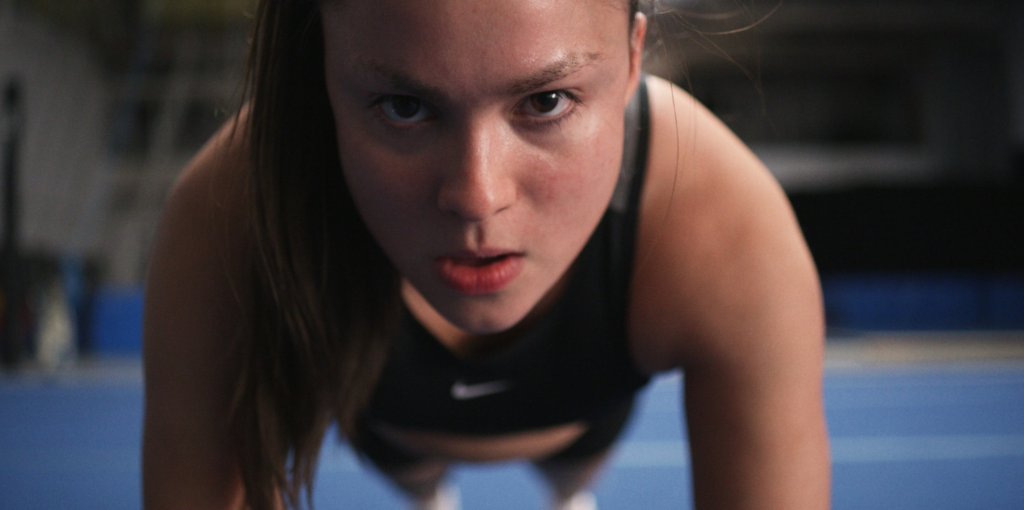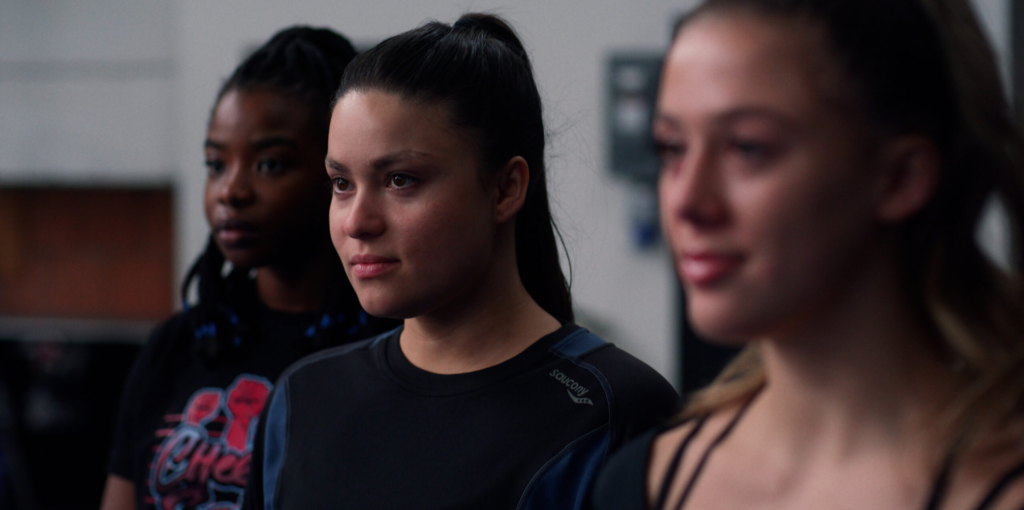Director: D.W. Waterson
Writers: Joanne Sarazen, D.W. Waterson
Stars: Devery Jacobs, Evan Rachel Wood, Kudakwashe Rutendo
Synopsis: Riley is given the chance to cheer with the all-star squad, Thunderhawks. With a competition looming, Riley must navigate her crippling anxiety, her relationship with her girlfriend, and her desperate need for approval from her new coach.
“This body’s not a cage, this body’s not a prison, this body’s no mistake, this body’s pushing limits.”

D. W. Waterson’s competitive cheerleading film begins with movement and music. The kineticism introduces the audience to the incredible athleticism of the young people hitting the mats with force and grace.
Riley (Devery Jacobs) is the captain and backspot of her mid-level team – the one who supports the flyers. The base of the pyramid is under her supervision. If someone falls, it’s because she wasn’t thinking fast enough. After the tumbles and backflips, an actual tumble occurs when flyer Rachel (Noa Diberto) crashes to the mat because of a dip by a base. Almost immediately the air is sucked out of Riley – she didn’t fall, but in her mind she failed. “Don’t go all dark,” her teammate and girlfriend Amanda (Kudakwashe Rutendo) tells her.
Cheerleading is Riley’s home. Her other home is Amanda. “Such a pretty girl,” according to Riley’s anxiety riddled Mom, Tracy (Shannyn Sossamon) whose perfectionism borders on obsessive disorder. Something which Riley also suffers from as she deals with panic attacks and trichotillomania. Riley is in a battle with herself, she must exercise precision and control to succeed. She sees her mother’s eagerness to please her father (who is just a hand with a remote-control playing sport at increasingly loud volumes) as self-effacement. But Riley’s own eagerness to please confuses her and the brutality she visits on her body is disproportionate to the dopamine fix of executing a perfect tuck.
The person she most wants to please is Eileen McNamara (Evan Rachel Wood), the coach of the professional team The Thunderhawks. Making it on to that team, especially with Rachel and Amanda is a dream – yet inside the dream is a waking nightmare she can’t parse. Cheerleading is something she’s done for years – her community is there. The love of her young life is there. So why does it hurt so much? And who is she willing to hurt for it?

The psychology of any athlete is complex. That complexity is multiplied when it is filtered through the malleable identity of being a teen. Riley’s fight or flight modes are in overdrive. Eileen’s coaching style is a mixture of negative and positive reinforcement, something which adds to Riley’s own confusion. The assistant coach, Devon (Thomas Anthony Olajide) is withering and snappy, but he is a sequined blanket for the team; he may scratch a little, but he is there to make them shine. What Eileen is aiming for is keeping the young women off balance to reshape them. Life is hard for gay sportspeople in Eileen’s estimation. Reject to protect. Become steel. Be unimpeachable. Yet she’s also the only person who manages to calm Riley properly during one of her panic attacks. In more than one way Eileen is a cult leader and Riley allows her personality to be subsumed.
“She has a wife! Could she be any more perfect?” Riley gushes to Amanda about Eileen. Amanda is more grounded. She can’t afford to only be a cheerleader despite being an accomplished one. Her mother, Denise (Olunike Adeliyi) is generous and chaotic but she’s also a single mom raising three kids. Amanda doesn’t have the money Riley does. She can’t spend every moment training because she needs to work. Amanda sees damage where Riley doesn’t – not only on the bodies of the young athletes but on their sense of self.
D. W. Waterson’s script written in conjunction with Joanne Sarazen displays immense sensitivity and understanding of how young people attempt to negotiate who they are. At no point does the film move into the “queer misery” trope. Riley and Amanda don’t suffer because they are gay. Their relationship is challenged because of reasons outside of their queerness. Money, mental health, slipping off the same page they believed they were on. When Riley swallows the Eileen Kool-Aid and physically assists in hurting Rachel to ensure she stretches into a wider split, Riley is breaking the trust of her friend and becoming a stranger to her girlfriend.

Backspot belies its modest budget and quick turn around shooting time. D. W. Waterson uses their musical and design aesthetic in conjunction with James Poremba’s whirling cinematography to make the film move in physical and psychological sync. It certainly doesn’t hurt that everyone in the film is beautiful even if they don’t feel they are. Laila (Marlee Samson) doesn’t conform to what would be considered ‘perfect body standards’ for a cheerleader and D. W. Waterson acknowledges that there are issues with the sport. At the same time Laila is shot to be glorious.
“Smile, happy, energy!” is the mantra for cheerleading. Make it look easy. No All-Star sport is easy. Its blisters, bruises, concussions, possible hospitalization. It’s using a tampon to stop a nosebleed. But it’s also flying like one is weightless, bodies moving in harmony with a rhythm built through a specific sorority. Cheerleading has little to do with the crop tops and false eyelashes – it is faith in teamwork. The sexiness of the sport is because it is athletic dance mixed with gymnastics. Once Riley realizes that what the sport gives her is belonging to her friends, she can find victory and a sense of calm. She can breathe and experience weightlessness.
Devery Jacobs is a force – physically and psychologically. The fierceness of her performance is matched by her raw vulnerability. Riley loves with passion, fear, and anger until she is shown by the “middle-aged” Devon (a perfect Thomas Anthony Olajide) that what she needs to be is messily human. That means letting go of the idea that she must fix every perceived bodily and emotional flaw. She doesn’t need to make herself Eileen’s “brick shit house” to be the best. Being the best in any competition is fleeting. Being a winner is not losing or denying yourself.
Noa Diberto is also superb as is Kudakwashe Rutendo. Both actors embody the brilliantly chaotic nature of youth. Diberto has incredible warmth and comic timing. Rutendo is sensitive, supportive, brave and switched the hell on.
Wonderfully shot, choreographed, scored, and acted, Backspot is not only everything you could wish for in a sports film, but also everything you want in a queer coming of age story. Dark and light collide to create magic under neon and laser lights. D. W. Waterson will have you cheering for their energetic, affecting, and intelligent work. Elite level filmmaking.





